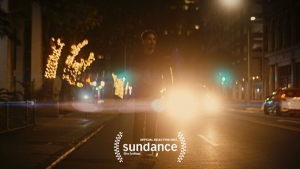(Video credit: Sundance Institute)
Alika Tengan said he is “honored to share this story with a community of artists I have admired greatly from afar.” The University of Hawaiʻi at Mānoa Academy for Creative Media graduate, who has already racked up several awards and achievements, will have his work featured for the first time at a major film festival. Every Day in Kaimukī premieres online at the Sundance Film Festival on January 23. It is one of seven films in the “next” category, which provides a showcase for what the festival calls, “pure, bold works distinguished by an innovative, forward-thinking approach to story-telling.”
Every Day in Kaimukī centers around Naz Kawakami, who is also a UH Mānoa alumnus. Kawakami has lived on Oʻahu his entire life, and regularly skateboards with his friends and hosts a radio show at KTUH, UH Mānoa’s student-run radio station. His girlfriend, however, has an opportunity to move 5,000 miles away to bustling New York. Kawakami begins preparations for their big move—every detail of it, including his cat’s lengthy flight plan.

Tengan, the film’s director and screenwriter, documents Kawakami’s thoughts and emotions of moving away from a place he has spent his entire life, wondering if he is making the right decision. Some elements are fictionalized, Tengan explained, to better express some of the other things Kawakami was dealing with. Tengan said that Every Day in Kaimukī provides all viewers with something to relate to, especially for those moving away or to Hawaiʻi.
“Talking to our producer on the film, she is from Costa Rica, and she really related to it a lot as well so I think anyone that has made a transcontinental move or a larger move to a larger city can find something to relate to,” Tengan said. “I hope (viewers) can expect just a different slice of life story of what it means to have grown up in Hawaiʻi and lived here your whole life and maybe wanting more than some of the other people around you. In wrestling with that sort of conflict of knowing that part of you feels really lucky and grateful, but at the same time wanting more and something different.”
Kawakami, who graduated with a degree in English, has always seen himself as more of a writer than an actor. He said he is feeling “anxious” ahead of the premiere, and wants to give credit to Tengan for all that he has accomplished with the film.
“Good for Alika,” said Kawakami, who is living in New York. “First try and first feature to make it into Sundance and premiere is pretty exceptional. I also think it’s worth noting the speed at which it was written and made. We wrote it in six days in our spare time and executed filming in probably 13 days so considering the amount of time and how we treated it, I’m very impressed and in disbelief at the recognition it is receiving.”
Tengan also said he has been told this is the first Native Hawaiian feature length film to premiere at Sundance.
“That’s a huge honor for me and Naz because we’re both Hapa—Hawaiian and Japanese,” Tengan said. “We’re both honored to represent Hawaiʻi in that way.”
How to watch
Every Day in Kaimukī premieres online on January 23 at 4 a.m. (HST) and will be available until 7 a.m. (HST). Its second screening starts on January 24 at 7 p.m. (HST) and will be available for 24 hours. The film will also be shown at various locations across the U.S. in late January. For more information and to purchase tickets, visit the Sundance website.
Journey to the spotlight
Tengan and Kawakami connected through various different projects. Kawakami appeared in one of Tengan’s previous short films Mauka to Makai. The pair also worked as radio DJs at KTUH on the Mānoa campus.
“Naz is a radio DJ in the movie so we were able to film a couple of scenes at KTUH in cooperation with a lot of the people there. I’m really stoked that we got to film at KTUH because it was a huge part of me and Naz’s life,” Tengan said.
Kawakami was first introduced to the radio station when he was a teeanger performing in a band for KTUH’s Monday Night Live, before becoming a DJ as a UH Mānoa student.
“To have it featured is great. I think it’s worthwhile, especially considering its legacy and the format that it’s in—it’s one of maybe 10 or 15 radio stations in the country that are very true as far as college radio stations go. I take a lot of pride in the time I spent there,” Kawakami said.
Building a successful film career
This honor is just the latest in a series of accolades for Tengan. His film Molokaʻi Bound was showcased in 2019 at the Hawaiʻi International Film Festival. Molokaʻi Bound also earned Tengan a spot on The Indigenous List, selected by The Black List in 2020. To be considered, Indigenous artists needed to submit film or TV scripts, and describe how their native culture supported their ideas and process as a screenwriter. Then in late 2021, Tengan became the first filmmaker to receive Array/Google’s Feature Film Grant, an inaugural award to support rising filmmakers from historically excluded backgrounds. The award was worth $500,000.
This work is an example of UH Mānoa’s goal of Enhancing Student Success (PDF), one of four goals identified in the 2015–25 Strategic Plan (PDF), updated in December 2020.
—By Marc Arakaki

